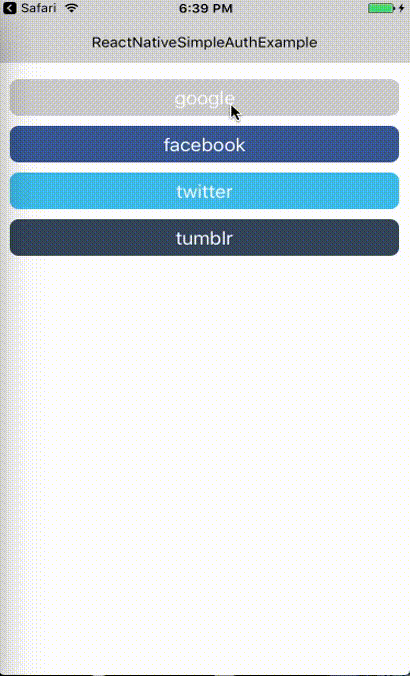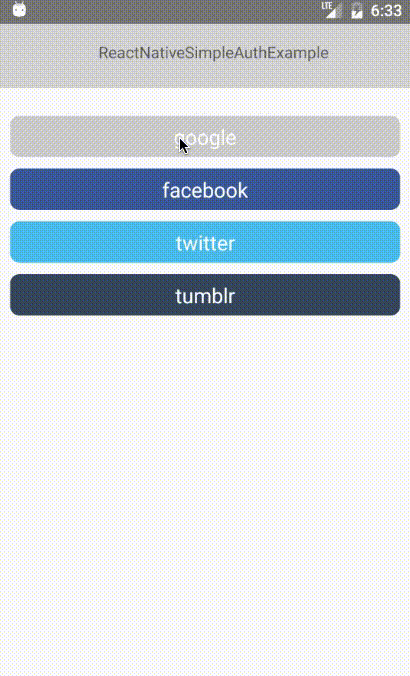2.4.0 • Published 8 years ago
react-native-simple-auth v2.4.0
react-native-simple-auth 
OAuth login for React Native
Screencast
| iOS | Android |
|---|---|
 |  |
Source of example app: https://github.com/adamjmcgrath/ReactNativeSimpleAuthExample
Install
yarn add react-native-simple-auth- Set up deep linking for your Android and iOS application using the instructions on the react-native website (set the
launchModeofMainActivitytosingleTaskinAndroidManifest.xml, create the deep link schemes in Providers Setup) - Set up your OAuth Providers
Providers Setup
- Go to the developer console and create credentials for an iOS application (you can also use these for your Android app). More instructions on the Google support site.
- The "Bundle ID" should contain a dot, eg
com.reactnativesimpleauth - Your configuration object should contain the 'Client ID' as
appIdand 'Bundle ID' in thecallback(note the single/, you can put anything as the path), eg
{
appId: '123-123abc.apps.googleusercontent.com',
callback: 'com.reactnativesimpleauthexample:/oauth2redirect'
}- Add the deep link scheme for the callback (Your Bundle ID, eg
com.reactnativesimpleauthexample) to yourAndroidManifest.xmleg https://github.com/adamjmcgrath/ReactNativeSimpleAuthExample/blob/master/android/app/src/main/AndroidManifest.xml#L28-L33 - Add the deep link scheme for the callback to your iOS app, eg https://dev.twitter.com/cards/mobile/url-schemes
- Create an app on the Facebook developers website
- In
Settings, clickAdd Platform - Select iOS, and in the
Bundle IDfield, addfb{your App ID}egfb1234567890(You can use the same configuration for Android) - Your configuration object should contain the 'Appid ID' as
appIdand 'Bundle ID' in thecallback(you must put://authorize), eg
{
appId: '1234567890',
callback: 'fb1234567890://authorize',
scope: 'user_friends', // you can override the default scope here
fields: ['email', 'first_name', 'last_name'], // you can override the default fields here
}- Add the deep link scheme for the callback (Your Bundle ID, eg
fb1234567890) to yourAndroidManifest.xmleg https://github.com/adamjmcgrath/ReactNativeSimpleAuthExample/blob/master/android/app/src/main/AndroidManifest.xml#L28-L33 - Add the deep link scheme for the callback to your iOS app, eg https://dev.twitter.com/cards/mobile/url-schemes (Due to A Facebook bug, this should always be the top one in the list)
- Create an app on https://apps.twitter.com
- You can put any valid URL as the callback url.
- Your configuration object should contain the 'Consumer Key (API Key)' as
appId, the 'Consumer Secret' asappSecretand the TwitterApp namein thecallback, eg
{
appId: 'abc1234567890',
appSecret: 'cba0987654321',
callback: 'testapp://authorize',
}- Add the deep link scheme for the callback (Your App Name, eg
testapp) to yourAndroidManifest.xmleg https://github.com/adamjmcgrath/ReactNativeSimpleAuthExample/blob/master/android/app/src/main/AndroidManifest.xml#L28-L33 - Add the deep link scheme for the callback to your iOS app, eg https://dev.twitter.com/cards/mobile/url-schemes (Due to A Facebook bug, this should always be the top one in the list)
Tumblr
- Create an app on https://www.tumblr.com/oauth/apps
- You can put any valid URL as the callback url.
- Your configuration object should contain the 'OAuth Consumer Key' as
appId, the 'OAuth Consumer Secret' asappSecretand anycallback, eg
{
appId: '1234567890abc',
appSecret: '1234567890abc',
callback: 'testapp://authorize',
}- Add the deep link scheme for the callback (Your App Name, eg
testapp) to yourAndroidManifest.xmleg https://github.com/adamjmcgrath/ReactNativeSimpleAuthExample/blob/master/android/app/src/main/AndroidManifest.xml#L28-L33 - Add the deep link scheme for the callback to your iOS app, eg https://dev.twitter.com/cards/mobile/url-schemes (Due to A Facebook bug, this should always be the top one in the list)
Usage
Create a configuration object for each of the providers you want to authorize with (required keys are in parenthesis):
- google (
appId,callback) - facebook (
appId,callback) - twitter (
appId,appSecret,callback) - tumblr (
appId,appSecret,callback)
See secrets.example.js.
import { google, facebook, twitter, tumblr } from 'react-native-simple-auth';
google({
appId: '123-123abc.apps.googleusercontent.com',
callback: 'com.reactnativesimpleauthexample:/oauth2redirect',
}).then((info) => {
// info.user - user details from the provider
// info.credentials - tokens from the provider
}).catch((error) => {
// error.code
// error.description
});License
react-native-simple-auth is released under the MIT license.
2.4.0
8 years ago
2.3.0
8 years ago
2.2.0
8 years ago
2.1.0
9 years ago
2.0.1
9 years ago
2.0.0
9 years ago
0.3.0
10 years ago
0.2.9
10 years ago
0.2.8
11 years ago
0.2.7
11 years ago
0.2.6
11 years ago
0.2.5
11 years ago
0.2.4
11 years ago
0.2.3
11 years ago
0.2.1
11 years ago
0.2.0
11 years ago
0.1.2
11 years ago
0.0.2
11 years ago
0.0.1
11 years ago
1.0.0
11 years ago